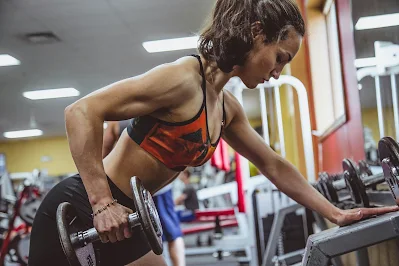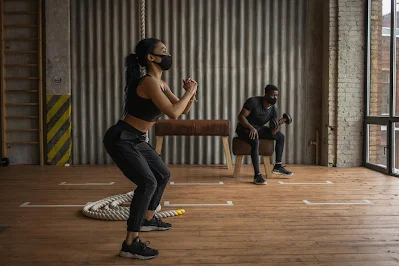Powerlifting for Women: Breaking Barriers
Introduction to Powerlifting
Powerlifting is a strength sport that involves three main lifts: squat, bench press, and deadlift. Unlike bodybuilding, which focuses on aesthetics, powerlifting is centered around lifting as much weight as possible for a single repetition in each of these lifts. It's a sport that requires not only physical strength but also mental fortitude and technique.
Women in Powerlifting
Historically, powerlifting has been dominated by men. However, in recent years, there has been a significant increase in the number of women participating in the sport. Despite this progress, women still face challenges and stereotypes within the powerlifting community.
Benefits of Powerlifting for Women
Participating in powerlifting offers a wide range of benefits for women. Not only does it improve physical strength and endurance, but it also has numerous mental health benefits, including stress relief and increased confidence.
Getting Started with Powerlifting
For women looking to get started with powerlifting, finding a knowledgeable coach or mentor is essential. They can provide guidance on proper technique and help tailor a training program to individual needs. Additionally, basic equipment such as weightlifting shoes and a supportive belt are recommended.
Overcoming Common Concerns
One common concern among women interested in powerlifting is the fear of bulking up. However, this is a misconception, as powerlifting primarily builds strength and muscle density without significantly increasing muscle size. Additionally, dealing with societal pressure and stereotypes can be challenging but is ultimately empowering.
Training and Techniques
Proper form is crucial in powerlifting to prevent injury and maximize performance. Learning the correct technique for each lift and practicing consistently is key to progress. Various powerlifting exercises, such as accessory movements and assistance exercises, can also complement the main lifts.
Setting Realistic Goals
Setting achievable goals is essential for progress in powerlifting. Whether it's increasing the weight lifted or improving technique, having both short-term and long-term goals helps to stay motivated. Tracking progress through training logs or apps can also provide valuable feedback.
Nutrition and Diet for Powerlifting
Nutrition plays a significant role in fueling the body for optimal performance in powerlifting. A balanced diet that includes adequate protein, carbohydrates, and fats is essential for muscle recovery and growth. Proper hydration and supplementation, such as protein powder or creatine, can also support training goals.
Injury Prevention and Recovery
Listening to your body and prioritizing rest and recovery is essential in preventing injuries in powerlifting. Overtraining can lead to burnout and increased risk of injury, so incorporating rest days into training programs is crucial. Foam rolling, stretching, and massage can also aid in recovery and muscle maintenance.
Female Powerlifting Role Models
Highlighting successful female powerlifters serves as inspiration for women in the sport. These role models demonstrate that strength has no gender and encourage others to pursue their passion for powerlifting without limitations.
Empowering Women Through Strength
Powerlifting empowers women by challenging stereotypes and societal norms surrounding femininity and strength. By building physical and mental strength, women gain confidence and self-esteem both inside and outside the gym, inspiring others to break barriers and defy expectations.
The Future of Women in Powerlifting
The future of women in powerlifting looks bright, with continued growth and opportunities for female athletes. As more women embrace the sport, perceptions of strength and femininity are evolving, paving the way for greater inclusivity and acceptance within the powerlifting community.
Female Representation in Powerlifting
In the past, powerlifting was predominantly seen as a male-dominated sport, with limited opportunities for female athletes. However, in recent years, there has been a significant shift in perception and acceptance of women in powerlifting. This change is evident not only in the increasing number of female participants but also in the recognition and support they receive within the powerlifting community.
Female representation in powerlifting competitions has grown steadily, with women competing at local, national, and international levels. Organizations such as the International Powerlifting Federation (IPF) and the American Powerlifting Federation (APF) have actively promoted gender equality and provided platforms for female athletes to showcase their strength and skills. As a result, women's powerlifting has gained recognition as a legitimate and respected sport, with its own dedicated fan base and following.
Breaking Stereotypes and Challenging Norms
One of the most significant barriers faced by women in powerlifting is the pervasive stereotype that strength and muscularity are inherently masculine traits. This stereotype not only undermines women's abilities but also perpetuates harmful gender norms that limit women's participation in strength sports. However, female powerlifters are challenging these stereotypes by proudly embracing their strength and athleticism.
By defying societal expectations and pushing the boundaries of what it means to be feminine, female powerlifters are inspiring a new generation of women to pursue their passions without fear of judgment or discrimination. They are proving that strength knows no gender and that women can excel in any sport they choose, including traditionally male-dominated ones like powerlifting.
Mental Health Benefits of Powerlifting
In addition to its physical benefits, powerlifting also offers significant mental health benefits for women. The process of setting and achieving goals, overcoming challenges, and pushing one's limits fosters resilience, self-confidence, and a sense of empowerment. Many female powerlifters report feeling more confident and capable both inside and outside the gym as a result of their training.
Moreover, powerlifting can serve as a form of therapy for women struggling with mental health issues such as anxiety, depression, or low self-esteem. The discipline, focus, and sense of accomplishment gained through powerlifting can provide a much-needed sense of purpose and fulfillment, helping women to improve their overall well-being and quality of life.
Inclusivity and Supportive Communities
One of the most remarkable aspects of the powerlifting community is its inclusivity and supportiveness towards women of all shapes, sizes, and backgrounds. Unlike some other sports or fitness activities, which may prioritize aesthetics or competition over camaraderie and encouragement, powerlifting fosters a sense of belonging and camaraderie among its participants.
Female powerlifters often find themselves surrounded by like-minded individuals who share their passion for strength and fitness. Whether it's cheering each other on during training sessions, celebrating personal achievements, or offering support during setbacks, the powerlifting community provides a safe and supportive space for women to thrive and grow.
Intersectionality and Diversity in Powerlifting
It's important to recognize that women's experiences in powerlifting are not monolithic and may vary based on factors such as race, ethnicity, socio-economic status, or sexual orientation. Intersectionality plays a crucial role in shaping the challenges and opportunities faced by women in the sport, highlighting the need for greater diversity and inclusion initiatives within the powerlifting community.
By embracing intersectionality and acknowledging the unique struggles faced by marginalized women, the powerlifting community can work towards creating a more equitable and inclusive environment for all. This includes actively promoting diversity in leadership roles, addressing issues of accessibility and representation, and amplifying the voices of underrepresented groups within the sport.
Conclusion
In conclusion, powerlifting offers women a powerful platform to break barriers, challenge stereotypes, and empower themselves both physically and mentally. By embracing their strength and athleticism, female powerlifters are redefining what it means to be feminine and inspiring others to do the same. With continued support and advocacy, the future of women in powerlifting looks brighter than ever, promising increased representation, inclusivity, and opportunities for female athletes around the world.
FAQs (Frequently Asked Questions)
Is powerlifting safe for women?
Yes, when performed with proper technique and under the guidance of a qualified coach, powerlifting is a safe and effective form of exercise for women.
Will powerlifting make me bulky?
No, powerlifting primarily builds strength and muscle density without significantly increasing muscle size, so it's unlikely to make women bulky.
Do I need to lift heavy weights to benefit from powerlifting?
While lifting heavy weights is a fundamental aspect of powerlifting, beginners can start with lighter weights and gradually increase as they build strength and confidence.
How often should I train for powerlifting?
Training frequency can vary depending on individual goals and experience levels, but most powerlifters train 3-4 times per week with adequate rest between sessions.
Can anyone participate in powerlifting competitions?
Yes, powerlifting competitions are open to lifters of all ages and experience levels, providing an inclusive environment for women to showcase their strength and skills.


